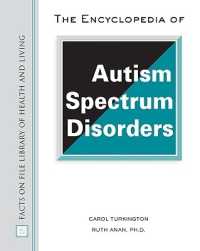- ホーム
- > 洋書
- > 英文書
- > Religion / Ethics
Full Description
In Blind Evolution?: The Nature of Humanity and the Origin of Life, Professor David Frost challenges the dominant worldview derived from Darwin's evolutionary theories and perpetuated in Richard Dawkins's atheistic propaganda for Neo-Darwinism: that our universe has 'at bottom, no design, no purpose, no evil and no good, nothing but blind, pitiless indifference'.
Frost deploys recent findings from a range of scientific studies that shake Neo-Darwinism to its foundation. Citing entertaining examples, from the inner workings of a single cell to the animal kingdom at large, from elephants and giraffes to the Japanese pufferfish, Frost maintains that Darwinian premises are wholly inadequate to engage with life or to provide a framework for our experiences of joy and sorrow, the problem of suffering, and the stark realities of good and evil.
Reflecting on the nature of existence, Frost points to a mode of human understanding parallel to scientific enquiry through the path of 'vision' accessed via the nous (or spiritual intellect). He argues that 'vision' is as much essential to our understanding of creation as is scientific enquiry - reality is best approached through a complementary partnership of both.
Contents
List of Illustrations
Preface
1. The Answers of the Book of Job and the Experience of Mankind
2. Has Modern Science Proved there Is No Creator God?
3. The Assault of Modern Atheism on Religious Faith
4. Neo-Darwinism versus Intelligent Design
5. The Prestige of Scientific Knowledge and Other Approaches to Truth
6. The Evidence for a New Species, Homo Theos, the 'God-Man', Unifies Our Understanding
7. Science Must Partner 'Nous': A Necessary Marriage
8. 'To See Things as They Are': The Necessary Concurrence of Vision with Evidence
9. The Witness of the Natural Sciences
10. 'To See Things as They Are': When Evidence Confirms Vision
11. 'To See Things as They Are': Mr Toad on 'The Ship of Fools'
12. What Is Truth?
Conclusion: 'To See Things as They Are': The Consequences of Observation
Epilogue
Bibliography








